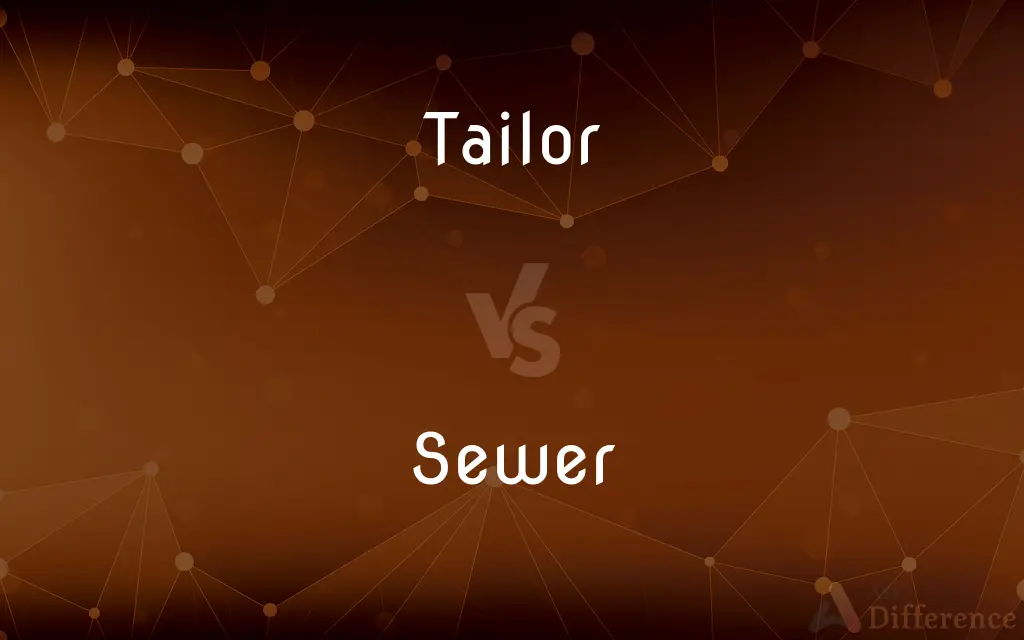Tailor vs. Sewer — What's the Difference?
By Maham Liaqat & Fiza Rafique — Updated on March 26, 2024
A tailor specializes in adjusting and creating garments to fit individual bodies, focusing on customization and repair, while a sewer refers to someone who sews fabric, often without the specific focus on fitting and alterations.

Difference Between Tailor and Sewer
Table of Contents
ADVERTISEMENT
Key Differences
A tailor is a professional skilled in altering and making clothes to fit an individual's body precisely. They work with specific measurements to ensure garments fit perfectly, often focusing on formal wear like suits and dresses. Tailors have the expertise to adjust the size, shape, and style of clothing, making them essential for custom-made or tailored fit clothing. On the other hand, a sewer can be anyone who sews, ranging from hobbyists to professionals, without necessarily specializing in clothing alterations or custom fittings. Sewers might create a variety of items from fabric, including clothes, accessories, and home decor, applying basic to advanced sewing techniques.
Tailors often possess advanced skills in fitting garments to the contours of the body, understanding fabric behavior, and making complex adjustments. They might work in specialized shops or departments and are sought after for their precision in creating and adjusting high-quality garments. Conversely, sewers engage in a broader range of sewing activities that can include creating garments from patterns, but their work might not require the detailed fitting and customizations that tailors perform.
While tailors are traditionally associated with a higher level of craftsmanship in garment making and alteration, focusing on the detailed and customized fit, sewers may embrace a wider scope of fabric-related projects. Sewers engage in sewing as a craft or profession without the implicit requirement of tailoring skills, which are specific to garment fitting and alteration.
The role of a tailor is often essential in the fashion industry, where bespoke clothing and tailored adjustments are in demand. Their work is critical for individuals seeking garments tailored to their specific body measurements and preferences. In contrast, sewers contribute significantly to both the fashion industry and the broader world of textiles, offering skills that range from garment creation to the production of a wide array of sewn goods.
Both tailors and sewers play important roles in the creation and maintenance of clothing and textiles. Tailors offer a specialized service that ensures clothing fits well and flatters the wearer, while sewers provide a broad spectrum of sewing-related services and projects, from fashion to home décor. The distinction lies in the specialization and focus of their skills.
ADVERTISEMENT
Comparison Chart
Definition
A professional who alters clothes for a custom fit.
Someone who sews fabric, possibly as a hobby or trade.
Focus
Custom fitting and alterations.
General sewing projects without a focus on fitting.
Skills
Advanced fitting, altering, and fabric knowledge.
Broad sewing skills, from basic to advanced.
Typical Projects
Suits, dresses, formal wear adjustments.
Clothing, accessories, home decor.
Industry Role
Essential in fashion for bespoke and tailored items.
Broad contribution to textiles, fashion, and crafts.
Compare with Definitions
Tailor
Expert in clothing alterations.
The tailor adjusted the suit to fit perfectly.
Sewer
May create a variety of textile items.
As an avid sewer, she makes her own curtains and pillowcases.
Tailor
Creates custom garments.
She visited a tailor to have her wedding dress made.
Sewer
Engages in sewing fabric.
The sewer crafted a beautiful quilt as a gift.
Tailor
Specializes in fitting clothes.
The tailor took his measurements for a custom shirt.
Sewer
Uses patterns for garment creation.
The sewer followed a pattern to make a summer dress.
Tailor
Adjusts garments for a better fit.
The tailor shortened the sleeves of her jacket.
Sewer
Possibly a hobbyist or professional.
She started as a hobbyist sewer but now sells her creations.
Tailor
Works with precision on formal wear.
A tailor is often consulted for prom and wedding attire.
Sewer
Works on a range of sewing projects.
The sewer is currently working on a set of reusable shopping bags.
Tailor
A tailor is a person who makes, repairs, or alters clothing professionally, especially suits and men's clothing. Although the term dates to the thirteenth century, tailor took on its modern sense in the late eighteenth century, and now properly refers to makers of men's and women's suits, coats, trousers, and similar garments, commonly of wool, linen, or silk.
Sewer
An artificial, usually underground conduit for carrying off sewage or rainwater.
Tailor
A person whose occupation is making fitted clothes such as suits, trousers, and jackets to fit individual customers.
Sewer
A medieval servant who supervised the serving of meals.
Tailor
Another term for bluefish
Sewer
One that sews
A sewer of fine clothing.
Tailor
(of a tailor) make (clothes) to fit individual customers
He was wearing a sports coat which had obviously been tailored in London
Sewer
A pipe or system of pipes used to remove human waste and to provide drainage.
Tailor
Make or adapt for a particular purpose or person
Arrangements can be tailored to meet individual requirements
Sewer
A servant attending at a meal who is responsible for seating arrangements, serving dishes, etc.
Tailor
One that makes, repairs, and alters garments such as suits, coats, and dresses.
Sewer
One who sews.
Tailor
To make (a garment), especially to specific requirements or measurements.
Sewer
A small tortricid moth, the larva of which sews together the edges of a leaf using silk.
Tailor
To fit or provide (a person) with clothes made to that person's measurements.
Sewer
(transitive) To provide (a place) with a system of sewers.
Tailor
To make, alter, or adapt for a particular end or purpose
A speech that was tailored to an audience of business leaders.
Sewer
One who sews, or stitches.
Tailor
To pursue the trade of a tailor.
Sewer
A small tortricid moth whose larva sews together the edges of a leaf by means of silk; as, the apple-leaf sewer (Phoxopteris nubeculana)
Tailor
A person who makes, repairs, or alters clothes professionally, especially suits and men's clothing.
He works as a tailor on Swanston Street.
Sewer
A drain or passage to carry off water and filth under ground; a subterraneous channel, particularly in cities.
Tailor
(Australia) The bluefish (Pomatomus saltatrix).
Sewer
Formerly, an upper servant, or household officer, who set on and removed the dishes at a feast, and who also brought water for the hands of the guests.
Then the sewerPoured water from a great and golden ewer,That from their hands to a silver caldron ran.
Tailor
(ambitransitive) To make, repair, or alter clothes.
We can tailor that jacket for you if you like.
Sewer
A waste pipe that carries away sewage or surface water
Tailor
(transitive) To make or adapt (something) for a specific need.
The website was tailored to the client's needs.
Sewer
Someone who sews;
A sewer of fine gowns
Tailor
(transitive) To restrict (something) in order to meet a particular need.
A narrowly tailored law
Sewer
Misfortune resulting in lost effort or money;
His career was in the gutter
All that work went down the sewer
Pensions are in the toilet
Tailor
One whose occupation is to cut out and make men's garments; also, one who cuts out and makes ladies' outer garments.
Well said, good woman's tailor . . . I would thou wert a man's tailor.
Tailor
The mattowacca; - called also tailor herring.
Tailor
The goldfish.
Tailor
To practice making men's clothes; to follow the business of a tailor.
These tailoring artists for our laysInvent cramped rules.
Tailor
A person whose occupation is making and altering garments
Tailor
Make fit for a specific purpose
Tailor
Style and tailor in a certain fashion;
Cut a dress
Tailor
Create (clothes) with cloth;
Can the seamstress sew me a suit by next week?
Common Curiosities
Can a sewer perform tailoring tasks?
While sewers can have a variety of skills, tailoring requires specific expertise in fitting garments that not all sewers may possess.
Are tailoring skills more advanced than sewing?
Tailoring is a specialized form of sewing with a focus on garment fitting and alteration, requiring specific, often more advanced, skills.
Do tailors make clothes from scratch?
Yes, tailors can create custom garments from scratch, in addition to altering existing ones.
What distinguishes a tailor from a sewer?
A tailor specifically alters and creates clothing for a custom fit, while a sewer engages in a broader range of sewing tasks.
Can someone be both a tailor and a sewer?
Yes, an individual can be both if they possess the broad skills of sewing along with the specialized skills of tailoring.
How long does it take to become a skilled tailor?
Becoming a skilled tailor can take several years of training and practice, depending on the level of expertise achieved.
Do tailors specialize in specific types of clothing?
Some tailors may specialize in certain types of clothing, such as menswear or bridal wear, depending on their expertise.
How does one choose between a tailor and a sewer for a project?
The choice depends on the project’s needs: custom fitting and alterations require a tailor, while broader sewing projects can be handled by a sewer.
Is tailoring more expensive than general sewing?
Due to the specialized nature and custom fitting involved, tailoring services can be more expensive than general sewing projects.
What is the primary goal of a tailor?
The primary goal of a tailor is to adjust and create garments that fit an individual’s body precisely.
Do sewers only work on clothing?
No, sewers can work on a wide range of projects, including clothing, accessories, and home decor.
What educational background is required to become a tailor?
Formal education is not always required; many tailors learn through apprenticeships or vocational training in garment construction and alteration.
What tools are essential for a tailor?
Tailors use various tools, including sewing machines, needles, thread, measuring tapes, and scissors, tailored to garment alteration and creation.
What is the importance of a sewer in the textile industry?
Sewers play a crucial role in the textile industry by contributing to the creation of a wide variety of fabric-based items.
Can tailoring be self-taught?
While challenging, it is possible to learn tailoring through self-study, practice, and possibly online resources or courses.
Share Your Discovery

Previous Comparison
Plein vs. Plain
Next Comparison
Dig vs. PickAuthor Spotlight
Written by
Maham LiaqatCo-written by
Fiza RafiqueFiza Rafique is a skilled content writer at AskDifference.com, where she meticulously refines and enhances written pieces. Drawing from her vast editorial expertise, Fiza ensures clarity, accuracy, and precision in every article. Passionate about language, she continually seeks to elevate the quality of content for readers worldwide.















































